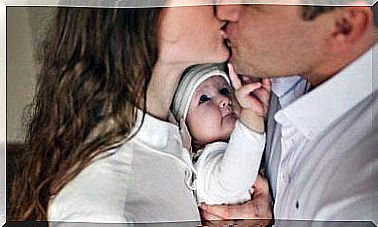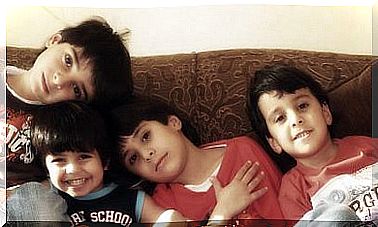The Phase Of Self-centeredness In Children. Danger!

Self-centeredness in children manifests itself from an early age. The question is: how should we parents behave at this stage
What self-centeredness entails in children
When a person displays self-centeredness it means that he thinks only of himself and does not care about what others think. Well, in the case of children, something different happens: the fact that they display self-centeredness does not necessarily mean that they are self-centered. They are simply going through an evolutionary phase.
At this stage, children claim to be the protagonists as they have not yet developed so-called empathic thinking. Every child must go through this stage, indeed it is healthy for him to do so. And parents don’t have to give it more importance than it should. What they should do is show affection and patience towards the little one.
Stages of the phase of egocentrism in children
Saramago’s phrase refers to the evil that can derive from letting go of the selfishness of adults as well as children. That is why it is vital to know how to act during the self-centered stage in children. But first it is better to know the stages of this phase. Below we illustrate them:
Discovery stage
In this stage the child learns from everything around him. So, if he notices individualistic behavior, he will imitate it. This is why it is important to teach him to behave correctly by giving him a good example.
Step of creating a bond
It occurs when feelings of affection and friendship arise in the child. According to psychologist Paul Osterrieth, children up to five years of age don’t feel the need to share things with others. They do not understand, in fact, that when you play you do it to achieve a common goal.
However, between the ages of 6 and 7, the child begins to understand what cooperation is. In this stage he begins to share his goods with others, thus manifesting the bond that unites him with them.
Acceptance stage
In this stage the child demonstrates that he has already learned the right social skills. Such skills or behaviors are learned through education, imitation, preparation and practice. This is the goal that every parent must strive to achieve with their children.
When does the phase of self-centeredness begin in children?
When does the phase of self-centeredness begin in children? Many parents will have wondered. According to several studies, the phase of self-centeredness in children occurs from 2-3 years of age. It happens because every individual tends to be self-centered by nature. However, a good development given by a good education can cause this trend to change.

Manifestations of self-centeredness in children
During the self-centered stage, it is very common for children to indulge in tantrums easily. This is because, especially the little ones, do not yet realize and when faced with a refusal, they feel great frustration.
Through tantrums and screams, kicks and insults, the child tries to get what he wants. It is therefore necessary to help him to ensure that these whims do not become the norm.
How to behave during the phase of children’s self-centeredness
Parents must have a positive attitude, always bearing in mind that different behavior on the part of their children is possible if they are constantly urged to behave well. To do this, you can follow some of the following tips.
In the case of a whim due to the child’s self-centered behavior, what you need to do is not give him what he wants to calm down or distract him with another alternative. The ideal attitude is to stay calm or explain to him how things are. And you have to do it in a few words.
Once the tantrum is over, you can explain to the child what we expect from him next time. Furthermore, it is essential that the family environment be quiet and peaceful.
The role played by the complete acquisition of language
The stage of self-centeredness in children will begin to disappear with the full development of language. That is, around 4 years old. The reason is that, through language, children begin to socialize with others and to understand other points of view as well. This is how they develop maturity and understanding.

No force, urge
To exhort and not to force, this must be the motto of every parent when teaching their children the importance of sharing. For this reason, through their own behavior, parents can teach their children that there are other people and that these people also have needs.
It is therefore essential to make the child understand that you can have fun sharing things with others. An aspect that can be interesting and that can be achieved mainly by setting a good example.
Do not resort to obligation
Parents shouldn’t force their children to share games if they don’t want to. Rather, they must be taught how to do things. It is one thing to oblige, another, quite different, is to teach. Nor should they be ridiculed for their behavior. If this is done, the child will feel that he is not understood.
These are just a few ways to act during the self-centered stage in children. The important thing is to teach calmly and by example. This is something that parents shouldn’t take for granted when teaching.









